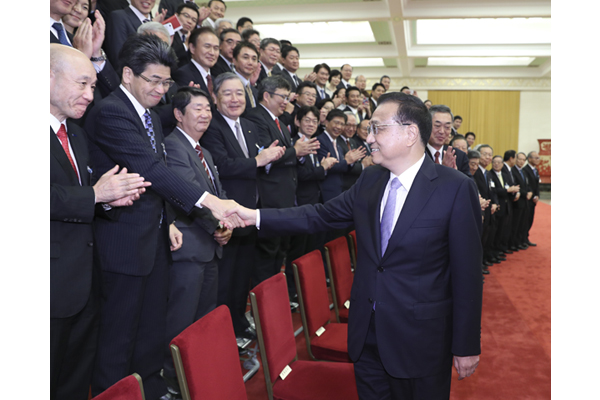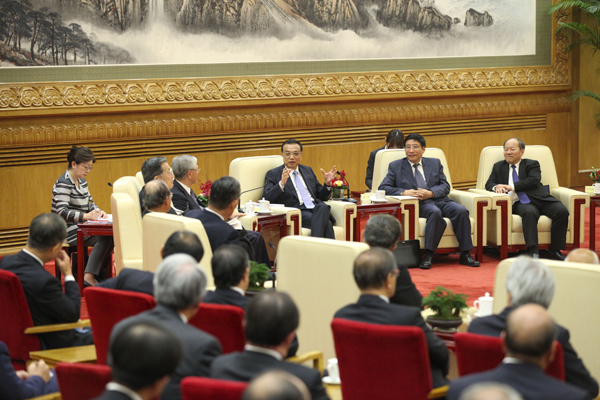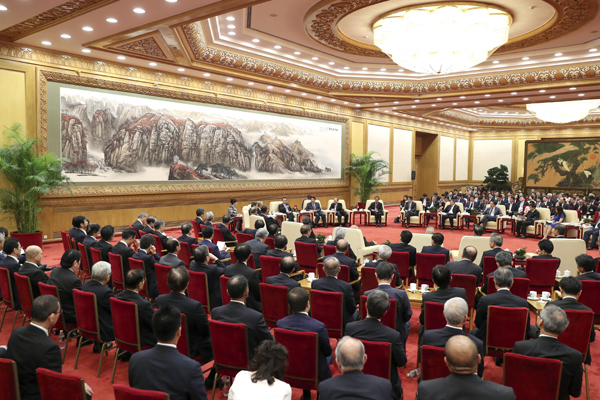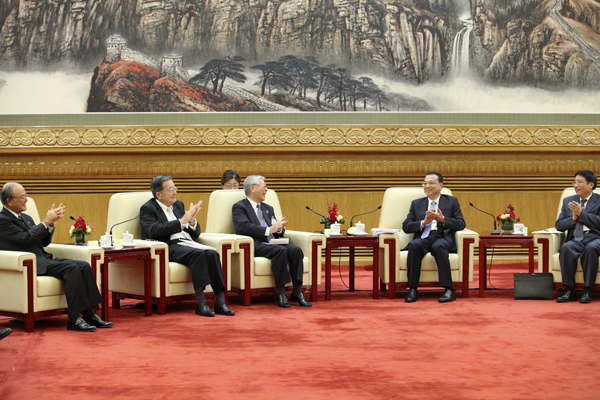
“China is willing to work with Japan and other parties to push forward negotiations on the Regional Comprehensive Economic Partnership (RCEP), in a bid to facilitate trade and investment and build an open world economy,” Premier Li Keqiang said while meeting with a Japanese economic delegation in Beijing on Sept 12.
The delegation was headed by Chairman of Keidanren (Japan Business Federation) Hiroaki Nakanishi, Chairman of the Japan Chamber of Commerce and Industry Akio Mimura, and Chairman of the Japan-China Economic Association Shoji Muneoka.
They also expressed their willingness to promote negotiations on a free trade zone among China, Japan, and South Korea, and RCEP.

The three economic organizations joining the visit all occupy an important position in the Japanese economic community, and the delegation was composed of more than 200 executives from Japanese companies, many of whom were from top companies in Japan.
Premier Li first extended a welcome to the delegation. With concerted efforts from both sides, China-Japan relations have maintained a momentum of improvement, he said, citing economic cooperation as a “propeller” of bilateral ties.
“This year marks the 40th anniversary of the China-Japan Treaty of Peace and Friendship,” Premier Li said, noting that “China and Japan should always adhere to the principles set in the four political documents signed by the two sides, learn from the past, and face the future.”
The two countries, he added, should proceed from the fundamental and long-term interests of the two peoples; stay in the right direction of peace, friendship and cooperation; consolidate the momentum of improving bilateral relations; and promote the steady development of bilateral ties.
“China and Japan are close neighbors, and developing friendly and reciprocal relations not only benefits both sides, but also serves global prosperity and stability,” Hiroaki Nakanishi said.
Shoji Muneoka said the large delegation of more than 200 members reflects the sincere wishes of the Japanese economic sector to exchange with its Chinese counterpart.

As beneficiaries of free trade, Premier Li said, China and Japan should voice opposition against unilateralism and protectionism, and safeguard multilateralism and free trade, stabilizing the expectation for further recovery of the global economy.
In response, Hiroaki Nakanishi said the economic sector in Japan supports the joint effort of both nations to oppose protectionism, and uphold multilateralism and free trade.
Akio Mimura added that they are willing to accelerate the negotiations on a free trade zone among China, Japan and South Korea, and RCEP, to defend free trade with solid actions.
Premier Li said China is an active supporter and follower of multilateralism, and the nation will push forward the negotiations on a free trade zone among China, Japan and South Korea, and RCEP, to facilitate free trade and investment and build an open world economy.

Akio Mimura appreciated the measures the Chinese government has taken for their problems.
“I will urge the relevant departments to further resolve your reasonable and legitimate needs,” Premier Li responded.
The Premier added that China will unswervingly promote reform and opening-up, further relax market access, strictly protect intellectual property rights, and foster a law-based, enabling business environment up to international standards.
During Premier Li’s visit to Japan this May, a number of cooperation agreements were reached between the two countries, including promoting innovative development and establishing a dialogue mechanism.
Shoji Muneoka said that enterprises of the two countries should make full of their advantages and strengthen cooperation in the fields of innovation and the digital economy.
Hiroaki Nakanishi said the key to economic development lies in innovation, hoping to strengthen innovation cooperation with China in areas like “Society 5.0”.
“Innovative development has become unstoppable in globalization, and emerging industry formats, technologies and models are bringing great changes to economic development and human life,” the Premier said.
China is willing to use the Sino-Japanese innovative dialogue mechanism and step up cooperation in innovation and high technology, while strengthening “inclusive innovation” that involves and benefits everyone, the Premier added.
According to the Premier, China and Japan are highly complementary in industries as both nations are at different stages of the global industry chain. The two nations should avoid vicious competition, allow enterprises from both sides to give full play of their advantages, and work together to develop third-party markets in compliance with local laws.
The world economic scenario as well as China’s trade and investment patterns are undergoing profound changes, the Premier concluded, adding that as China-Japan ties have been brought back on track, the two countries will provide opportunities to each other, and Japanese companies that have grasped the opportunities will have a promising future.
